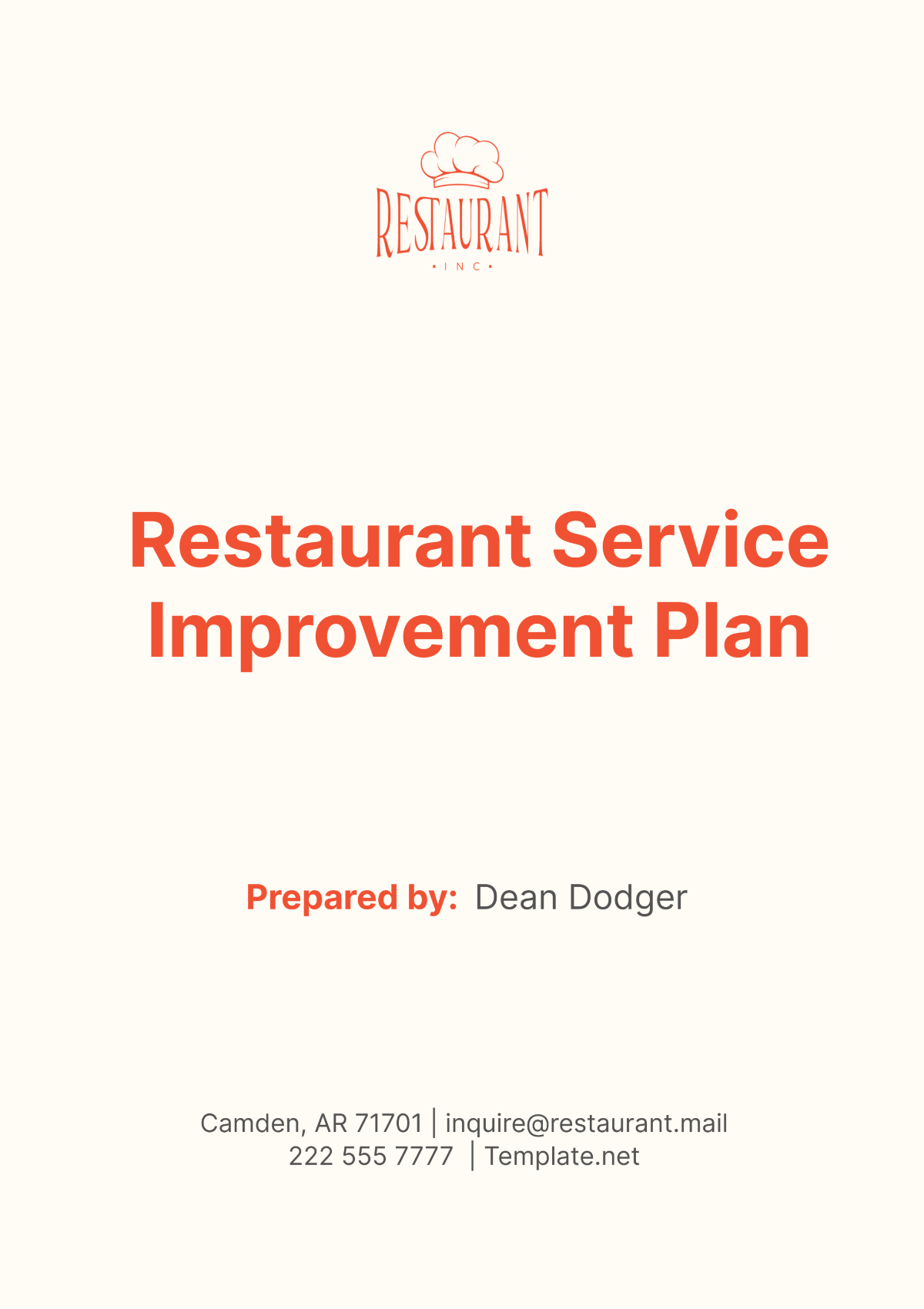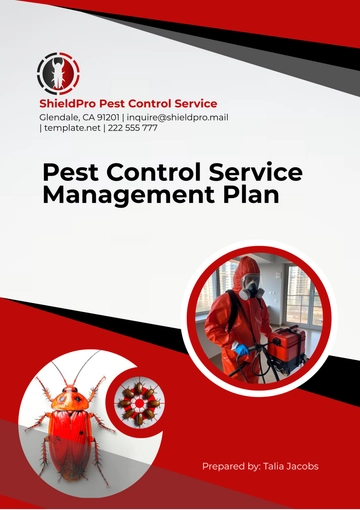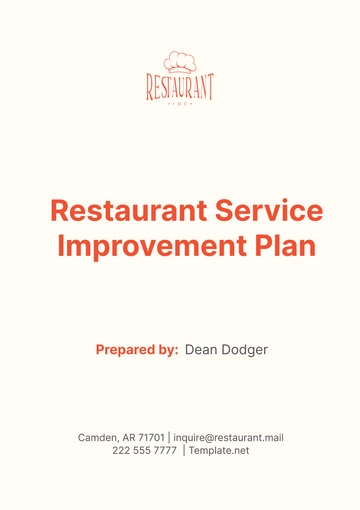Free Restaurant Service Improvement Plan

I. Executive Summary
The Restaurant Service Improvement Plan is a strategic initiative led by [YOUR NAME] at [YOUR COMPANY NAME], crafted to elevate guest satisfaction and optimize operational efficiencies. This document outlines our dedication to delivering exceptional service, serving as a blueprint for implementing systematic changes that ensure an unparalleled guest experience at every interaction.
Recent audits and customer feedback have underscored the need for improvement, aligning with our brand's commitment to excellence and competitive positioning in the industry. This plan provides a detailed methodology to assess current service levels, identifies areas requiring enhancement, and outlines the deployment of best practices in customer service. Our targeted strategies are designed to address existing shortcomings and establish new benchmarks in service quality.
Key Initiatives Include:
Comprehensive service audits and integration of customer feedback
Advanced training programs focusing on customer interaction and operational efficiency
Implementation of technology to streamline service delivery
The following sections detail our current challenges and provide structured action plans aimed at transforming these insights into measurable improvements.
II. Problem Statement
Despite [YOUR COMPANY NAME]'s high standards for customer service, recent evaluations have identified several critical areas where our services fall short of expected standards. Key concerns from customers include:
Slow Service Response Times: Extended waiting periods for order placement and delivery have frequently led to customer dissatisfaction.
Inconsistent Customer Engagement: Variability in staff interaction that negatively impacts the dining experience.
Inadequate Staff Knowledge: Employees often lack a thorough understanding of menu items, hindering their ability to offer personalized recommendations.
To illustrate, the table below highlights specific issues identified from customer surveys and internal assessments conducted over the past six months:
Customer Concern | Instances Recorded | Customer Feedback Score |
|---|---|---|
Slow Service Response Times | 150 instances | 2.5/5 |
Inconsistent Customer Engagement | 120 instances | 2.8/5 |
Inadequate Staff Knowledge | 100 instances | 2.7/5 |
Addressing these issues is critical not only to meet industry standards but to exceed them, thereby enhancing our market position and customer loyalty. Our plan outlines targeted improvements necessary to correct these deficiencies, focusing on training, process optimization, and enhancing customer interactions.
III. Goals and Objectives
The main goal of this initiative is to significantly enhance the service quality at [YOUR COMPANY NAME]. By establishing clear, measurable objectives, we aim to create a quantifiable impact on both customer and employee satisfaction, fostering a culture of continuous improvement and excellence. Our specific objectives for the year 2050 include:
Increase Customer Satisfaction Ratings: Raise customer satisfaction ratings by 20%, from a current baseline of 3.0 to a target of 3.6 out of 5.
Reduce Customer Complaint Rates: Lower customer complaint rates by 30%, focusing on the issues detailed above.
Improve Employee Satisfaction and Retention: Enhance the work environment to boost employee satisfaction scores by 15% and reduce staff turnover by 20%.
The table below outlines these objectives, providing metrics for measurement and target deadlines:
Objective | Metric | Baseline | Target | Deadline |
|---|---|---|---|---|
Increase Customer Satisfaction Ratings | Average Customer Satisfaction Score | 3.0/5 | 3.6/5 | December 2050 |
Reduce Customer Complaint Rates | Number of Monthly Customer Complaints | 370 | 259 | June 2050 |
Improve Employee Satisfaction and Retention | Employee Satisfaction Score, Turnover Rate | 70%, 25% | 85%, 5% | December 2050 |
These goals are set to not only enhance the dining experience but also to promote repeat business and positive word-of-mouth referrals, contributing to a sustainable growth model for the restaurant.
IV. Assessment of Current Services
A thorough initial audit of our current service practices is crucial to identifying gaps and planning effective interventions. This assessment will involve detailed observations of day-to-day operations, gathering inputs from staff at all levels, and collecting customer feedback. To facilitate a comprehensive evaluation, the following tools will be utilized:
Secret Diner Surveys: Anonymously assess service quality and staff interactions.
Staff Interviews: Gather firsthand insights into the challenges and opportunities perceived by our team.
Customer Satisfaction Tools: Utilize digital feedback tools post-visit to gauge customer satisfaction in real-time.
The findings from this assessment will be documented and analyzed to provide a clear depiction of current service challenges and success areas. This approach ensures an open, solutions-focused mindset that paves the way for actionable improvement strategies.
V. Strategy and Implementation Plan
To address the identified challenges and meet our objectives, the implementation of the following strategies is crucial:
Enhance Training Programs: Implement monthly training sessions focusing on customer service excellence, product knowledge, and conflict resolution.
Revise Operational Procedures: Streamline service processes to reduce wait times and improve service consistency. This includes revising the floor management system and enhancing the point-of-sale software for quicker transactions.
Launch Feedback Mechanism: Introduce a real-time feedback tool that allows customers to rate their service experience immediately. This will enable the management team to address any issues in real-time, ensuring immediate resolution and customer satisfaction.
The following table provides an overview of each strategy, including specific tasks, responsible individuals, and timelines:
Strategy | Tasks | Responsible | Timeline |
|---|---|---|---|
Enhance Training Programs | Develop curriculum, Schedule sessions | HR Manager | Monthly in 2050 |
Revise Operational Procedures | Update software, Train staff on new procedures | Operations Manager | Start Q3 2050 |
Launch Feedback Mechanism | Implement software, Train staff on usage | IT Manager | Q2 2050 |
VI. Monitoring and Evaluation
Continuous evaluation is essential to ensure the effectiveness of the implemented strategies. A detailed monitoring plan will involve the following components:
Monthly Performance Reviews: Assess staff performance and customer service levels.
Customer Satisfaction Surveys: Conduct surveys quarterly to gather comprehensive customer feedback.
Staff Feedback Sessions: Hold bi-monthly meetings to collect staff insights and suggestions for further improvements.
Performance against the set goals will be reviewed quarterly, and the table below outlines the key performance indicators (KPIs) to track progress:
Goal | KPI | Measurement Frequency |
|---|---|---|
Increase Customer Satisfaction | Customer Satisfaction Score | Quarterly |
Reduce Customer Complaint Rates | Number of Complaints Recorded | Monthly |
Improve Employee Satisfaction and Retention | Employee Satisfaction Score, Turnover Rate | Bi-annually |
This structured approach ensures that the restaurant can adapt and consistently move toward achieving the highest standards in customer service.
VII. Risk Management
Implementing any change involves risks; therefore, identifying potential challenges and proactively planning mitigation strategies is vital. Key risks include:
Resistance to Change: Staff may resist new processes or technologies.
Training Inefficiencies: Ineffective training can fail to improve staff performance.
Technology Failure: New systems may face technical issues, disrupting operations.
Mitigation strategies for these risks are outlined below:
Risk | Mitigation Strategy |
|---|---|
Resistance to Change | Engage staff early in the process through feedback sessions. |
Training Inefficiencies | Monitor training effectiveness and adjust as needed. |
Technology Failure | Implement with redundancy and ensure proper staff training. |
VIII. Conclusion
The Restaurant Service Improvement Plan is a dynamic tool designed to propel [YOUR COMPANY NAME] towards service excellence. With dedicated implementation and continuous refinement of strategies, our establishment can realize significant improvements in customer satisfaction and operational efficiency.
[YOUR NAME] is committed to leading these efforts, ensuring that all team members are aligned with the company’s high standards and are supported throughout the process of elevating service quality. By addressing the risks and focusing on strategic objectives, we are confident in our ability to transform challenges into opportunities for growth.
- 100% Customizable, free editor
- Access 1 Million+ Templates, photo’s & graphics
- Download or share as a template
- Click and replace photos, graphics, text, backgrounds
- Resize, crop, AI write & more
- Access advanced editor
Revolutionize your restaurant's operations with Template.net's Restaurant Service Improvement Plan Template. Crafted for restaurateurs aiming to enhance customer experience, this comprehensive template offers editable sections tailored to your unique establishment. With our intuitive AI editor tool, customization is effortless. Elevate service standards, streamline operations, and boost customer satisfaction. Take the first step towards culinary excellence today!
You may also like
- Finance Plan
- Construction Plan
- Sales Plan
- Development Plan
- Career Plan
- Budget Plan
- HR Plan
- Education Plan
- Transition Plan
- Work Plan
- Training Plan
- Communication Plan
- Operation Plan
- Health And Safety Plan
- Strategy Plan
- Professional Development Plan
- Advertising Plan
- Risk Management Plan
- Restaurant Plan
- School Plan
- Nursing Home Patient Care Plan
- Nursing Care Plan
- Plan Event
- Startup Plan
- Social Media Plan
- Staffing Plan
- Annual Plan
- Content Plan
- Payment Plan
- Implementation Plan
- Hotel Plan
- Workout Plan
- Accounting Plan
- Campaign Plan
- Essay Plan
- 30 60 90 Day Plan
- Research Plan
- Recruitment Plan
- 90 Day Plan
- Quarterly Plan
- Emergency Plan
- 5 Year Plan
- Gym Plan
- Personal Plan
- IT and Software Plan
- Treatment Plan
- Real Estate Plan
- Law Firm Plan
- Healthcare Plan
- Improvement Plan
- Media Plan
- 5 Year Business Plan
- Learning Plan
- Marketing Campaign Plan
- Travel Agency Plan
- Cleaning Services Plan
- Interior Design Plan
- Performance Plan
- PR Plan
- Birth Plan
- Life Plan
- SEO Plan
- Disaster Recovery Plan
- Continuity Plan
- Launch Plan
- Legal Plan
- Behavior Plan
- Performance Improvement Plan
- Salon Plan
- Security Plan
- Security Management Plan
- Employee Development Plan
- Quality Plan
- Service Improvement Plan
- Growth Plan
- Incident Response Plan
- Basketball Plan
- Emergency Action Plan
- Product Launch Plan
- Spa Plan
- Employee Training Plan
- Data Analysis Plan
- Employee Action Plan
- Territory Plan
- Audit Plan
- Classroom Plan
- Activity Plan
- Parenting Plan
- Care Plan
- Project Execution Plan
- Exercise Plan
- Internship Plan
- Software Development Plan
- Continuous Improvement Plan
- Leave Plan
- 90 Day Sales Plan
- Advertising Agency Plan
- Employee Transition Plan
- Smart Action Plan
- Workplace Safety Plan
- Behavior Change Plan
- Contingency Plan
- Continuity of Operations Plan
- Health Plan
- Quality Control Plan
- Self Plan
- Sports Development Plan
- Change Management Plan
- Ecommerce Plan
- Personal Financial Plan
- Process Improvement Plan
- 30-60-90 Day Sales Plan
- Crisis Management Plan
- Engagement Plan
- Execution Plan
- Pandemic Plan
- Quality Assurance Plan
- Service Continuity Plan
- Agile Project Plan
- Fundraising Plan
- Job Transition Plan
- Asset Maintenance Plan
- Maintenance Plan
- Software Test Plan
- Staff Training and Development Plan
- 3 Year Plan
- Brand Activation Plan
- Release Plan
- Resource Plan
- Risk Mitigation Plan
- Teacher Plan
- 30 60 90 Day Plan for New Manager
- Food Safety Plan
- Food Truck Plan
- Hiring Plan
- Quality Management Plan
- Wellness Plan
- Behavior Intervention Plan
- Bonus Plan
- Investment Plan
- Maternity Leave Plan
- Pandemic Response Plan
- Succession Planning
- Coaching Plan
- Configuration Management Plan
- Remote Work Plan
- Self Care Plan
- Teaching Plan
- 100-Day Plan
- HACCP Plan
- Student Plan
- Sustainability Plan
- 30 60 90 Day Plan for Interview
- Access Plan
- Site Specific Safety Plan

